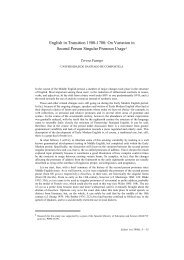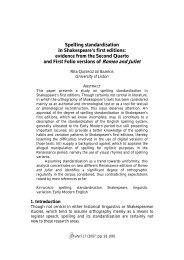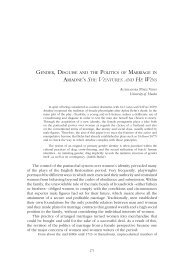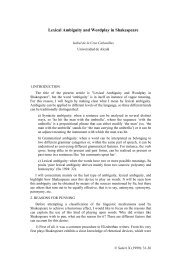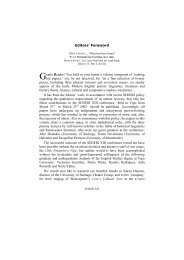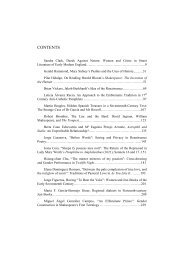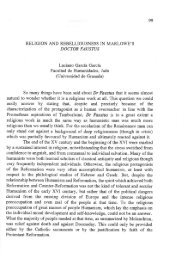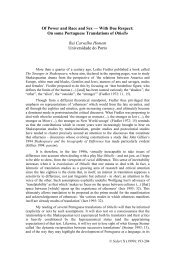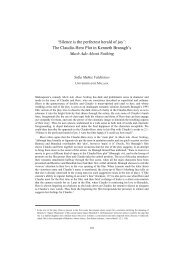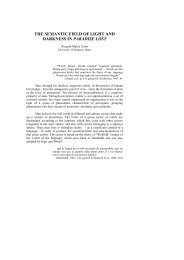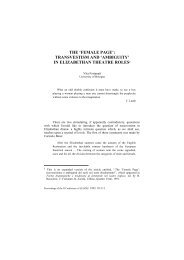Overreaching Flesh and Soul: The Theme of Damnation in ... - SEDERI
Overreaching Flesh and Soul: The Theme of Damnation in ... - SEDERI
Overreaching Flesh and Soul: The Theme of Damnation in ... - SEDERI
You also want an ePaper? Increase the reach of your titles
YUMPU automatically turns print PDFs into web optimized ePapers that Google loves.
<strong>Overreach<strong>in</strong>g</strong> <strong>Flesh</strong> <strong>and</strong> <strong>Soul</strong>: <strong>The</strong> <strong>The</strong>me <strong>of</strong><br />
<strong>Damnation</strong> <strong>in</strong> Christopher Marlowe’s Doctor Faustus<br />
<strong>and</strong> Tirso de Mol<strong>in</strong>a’s Don Juan<br />
Miguel Martínez López<br />
UNIVERSIDAD DE GRANADA<br />
<strong>The</strong> purpose <strong>of</strong> this essay is to explore some characteristic <strong>and</strong> <strong>in</strong>terrelated themes <strong>of</strong> the drama <strong>of</strong><br />
the Counter Reformation <strong>in</strong> Christopher Marlowe’s Dr. Faustus <strong>and</strong> Tirso de Mol<strong>in</strong>a’s El Burlador<br />
de Sevilla y Convidado de Piedra: among them, special attention is paid to freedom, predest<strong>in</strong>ation,<br />
reprobation, abnormal sexuality <strong>and</strong> love, with<strong>in</strong> the context <strong>of</strong> the subject <strong>of</strong> damnation. 1 <strong>The</strong><br />
results <strong>of</strong> this comparative analysis have confirmed my <strong>in</strong>itial hypothesis: Renaissance <strong>and</strong> Baroque<br />
drama, regardless <strong>of</strong> national differences, attended the spiritual needs that the tragedy <strong>of</strong> the religious<br />
schism <strong>of</strong> the sixteenth century had generated. Both, Marlowe <strong>in</strong> the Engl<strong>and</strong> <strong>of</strong> Queen Elizabeth’s<br />
Protestant restoration <strong>and</strong> Tirso <strong>in</strong> Catholic Spa<strong>in</strong>, like Shakespeare <strong>and</strong> Ben Jonson, Lope de Vega <strong>and</strong><br />
Calderón, addressed, <strong>in</strong> quite sophisticated ways, the major moral preoccupations <strong>and</strong> the feel<strong>in</strong>gs <strong>of</strong><br />
confusion <strong>of</strong> their age.<br />
In the case <strong>of</strong> Dr. Faustus <strong>and</strong> Don Juan, we immediately perceive both the distance with respect to<br />
Lutheran or Calv<strong>in</strong>ist apology <strong>of</strong> predest<strong>in</strong>ation <strong>and</strong> the l<strong>in</strong>ks to non-monolithic Catholic tenets. Above<br />
all, we encounter a most serious attack on the part <strong>of</strong> two baroque writers aga<strong>in</strong>st two typically<br />
Renaissance heroes, who are also agonists. <strong>The</strong>ir fall <strong>and</strong> their damnation constitute an important testimony<br />
<strong>and</strong> warn<strong>in</strong>g about the drama <strong>of</strong> the so-called “modern man”, the aspir<strong>in</strong>g overreacher <strong>of</strong> the<br />
Renaissance age. Indeed, the stories <strong>of</strong> Faustus <strong>and</strong> Don Juan portray a typically Renaissance world view;<br />
its love for transgression, its egocentrism (though not its sheer energy) are objects <strong>of</strong> severe criticism on<br />
the part <strong>of</strong> the two authors, which is the more puzzl<strong>in</strong>g s<strong>in</strong>ce they come from opposite religious backgrounds.<br />
Dr. Faustus <strong>and</strong> Don Juan are both blasphemous <strong>and</strong> s<strong>in</strong>ful, but not atheists. Both are hedonists <strong>and</strong><br />
represent hedonism, <strong>and</strong> their heteronomous patterns <strong>of</strong> behaviour make them overreachers <strong>and</strong> outsiders<br />
<strong>in</strong> a society they struggle to please <strong>and</strong> whose admiration they lust after. Both, Faustus <strong>and</strong> Don<br />
Juan, <strong>in</strong> short, epitomize an overreach<strong>in</strong>g strife aga<strong>in</strong>st two rather uncongeniable sides <strong>of</strong> the human<br />
be<strong>in</strong>g, the sensual <strong>and</strong> the <strong>in</strong>tellectual, while they try to make this world eternal <strong>and</strong> count on a late <strong>and</strong><br />
merely nom<strong>in</strong>al repentance to prevent damnation.<br />
<strong>The</strong>se two agonists, very much like Hamlet, are also <strong>in</strong>veterate procrast<strong>in</strong>ators. Half way between the<br />
tragic <strong>and</strong> the comic, both characters are supposed to have been sent to hell by their respective authors,<br />
while both rema<strong>in</strong> foundations <strong>of</strong> two parallel myths <strong>of</strong> overreach<strong>in</strong>g that have captivated all audiences<br />
<strong>and</strong> readers ever s<strong>in</strong>ce their creation.<br />
<strong>The</strong> comparison <strong>of</strong> the character Dr. Faustus, 2 as it is depicted by Ch. Marlowe to that <strong>of</strong> the first Don
108<br />
MIGUEL MARTÍNEZ LÓPEZ<br />
Juan, 3 the creation <strong>of</strong> a Spanish monk, Gabriel Téllez, the outst<strong>and</strong><strong>in</strong>g dramatist <strong>of</strong> the Spanish literary<br />
“golden age’, who is known to the world by the pen-name <strong>of</strong> Tirso de Mol<strong>in</strong>a, shows truly outst<strong>and</strong><strong>in</strong>g parallelisms;<br />
these also help us identify the real <strong>in</strong>terests <strong>of</strong> the playwrights <strong>and</strong> the audiences <strong>of</strong> the Europe<br />
<strong>of</strong> the late Renaissance.<br />
On the other h<strong>and</strong>, the appropriateness <strong>of</strong> the choice <strong>of</strong> the above versions is backed up at least by two<br />
considerations: first, the number <strong>of</strong> the literary versions <strong>of</strong> both myths are counted by the tens 4 <strong>and</strong>, therefore,<br />
the comparison <strong>of</strong> just two <strong>of</strong> the versions facilitates the narrow<strong>in</strong>g down <strong>of</strong> the focus as well as the<br />
limitation <strong>of</strong> the material to a manageable amount; secondly, both plays represent the first extant dramatization<br />
<strong>of</strong> the two myths, <strong>and</strong> they were written <strong>in</strong> a time-span <strong>of</strong> some thirty years: Dr. Faustus around 1592,<br />
though published posthumously <strong>in</strong> 1604, <strong>and</strong> El Burlador de Sevilla around 1620, though published later,<br />
<strong>in</strong> 1630). 5<br />
I. CH. MARLOWE’S DR. FAUSTUS AND T. DE MOLINA’S DON JUAN: A COMPARATIVE VIEW.<br />
<strong>The</strong> coupl<strong>in</strong>g <strong>of</strong> these two works may seem strik<strong>in</strong>g at first. We tend to picture Dr. Faustus gloomily<br />
sitt<strong>in</strong>g <strong>in</strong> his study, certa<strong>in</strong>ly not flirt<strong>in</strong>g around, but, upon close scrut<strong>in</strong>y, the Doctor <strong>of</strong> Wittenberg <strong>and</strong><br />
Don Juan share more than just tragic ends; all <strong>in</strong> all, Doctor Faustus <strong>and</strong> Don Juan are, from the po<strong>in</strong>t<br />
<strong>of</strong> view <strong>of</strong> genre, tragedies with numerous comic elements, loosely attached <strong>in</strong> the former while perfectly<br />
<strong>in</strong>tegrated <strong>in</strong> the latter: thus the common consideration <strong>of</strong> El Burlador de Sevilla as a “tragicomedy”.<br />
Also at the thematic <strong>and</strong> rhetorical levels, the two characters are connected with each other. Let us briefly<br />
explore first these common grounds.<br />
Both dramas tell the tragedy <strong>of</strong> a human soul; as their very titles suggest, they are, <strong>in</strong> essence, biographies:<br />
the more or less fictionalized history <strong>of</strong> John Faust, the Doctor <strong>of</strong> Wittemberg <strong>and</strong> that <strong>of</strong> Don<br />
Juan, “el Burlador de España” (the Spanish trickster). <strong>The</strong>y also share sources, approaches <strong>and</strong> themes.<br />
In both protagonists we meet legendary prototypes (the libert<strong>in</strong>e <strong>and</strong> the magician, overthrown by the<br />
power <strong>of</strong> God), which are themselves substantially older than the texts. Both dramas are supposed to be<br />
based on the life <strong>of</strong> a historical character, Georgius Faust or Johann Fust <strong>and</strong> the Count Leoncio or Juan<br />
de Tassis, Count <strong>of</strong> Villamediana. Both share also a German connection, s<strong>in</strong>ce Marlowe borrowed his<br />
plot from the German Faustbuch, while Tirso possibly drew on the script <strong>of</strong> a 1615 performance <strong>of</strong> a<br />
play, probably <strong>of</strong> Italian orig<strong>in</strong> <strong>and</strong> a very similar plot, held at the Jesuit College <strong>of</strong> Ingoldstad. Soon, our<br />
two heroes became universal myths <strong>and</strong> they began to be imitated, developed, adapted to new times <strong>and</strong><br />
places, while keep<strong>in</strong>g the essentials <strong>of</strong> their revolt <strong>and</strong> the drama <strong>of</strong> their fall. From 1630 to 1844, sixteen<br />
texts developed the tragedy <strong>of</strong> Don Juan 6 <strong>and</strong> the same applies to Dr. Faustus’s. 7<br />
From a thematic po<strong>in</strong>t <strong>of</strong> view, both plots present, <strong>and</strong> condemn, the Protestant negation <strong>of</strong> freedom<br />
<strong>and</strong> its subsidiary theory <strong>of</strong> predest<strong>in</strong>ation, which I will discuss below <strong>in</strong> some detail. Human freedom<br />
exists, under the <strong>in</strong>fluence <strong>of</strong> grace <strong>and</strong> “though eternal election <strong>and</strong> eternal reprobation do exist, they<br />
do not propter hoc destroy this human freedom” 8 . Both heroes are epitomes <strong>of</strong> overreach<strong>in</strong>g, whereas<br />
the attack on the concept <strong>of</strong> limit is typical <strong>of</strong> the Renaissance world view. This attack –as Hiram Haydn<br />
revealed <strong>in</strong> his book, suggestively entitled <strong>The</strong> Counter-Renaissance– 9 is rooted <strong>in</strong> the more general concept<br />
<strong>of</strong> vanitas; the vanity that results from <strong>in</strong>dulg<strong>in</strong>g <strong>in</strong> one or more, or all, <strong>of</strong> the three libidos –libido<br />
sciendi, libido sentiendi <strong>and</strong> libido dom<strong>in</strong><strong>and</strong>i– is undoubtedly a central issue <strong>in</strong> Marlowe’s <strong>and</strong><br />
Tirso’s drama as it was a central issue <strong>in</strong> the theological <strong>and</strong> cultural debate <strong>of</strong> the sixteenth <strong>and</strong> seven-
OVERREACHING FLESH AND SOUL: THE THEME OF DAMNATION IN CHRISTOPHER MARLOWE’S... 109<br />
teenth centuries. This repudiation <strong>of</strong> the concept <strong>of</strong> limit <strong>and</strong> self-restra<strong>in</strong>t, so typical <strong>of</strong> this period, reveals<br />
itself <strong>in</strong> a form <strong>of</strong> anxiety; moreover, this anxiety exhorts to break all rules, to trespass –hopefully<br />
unwounded– the farthest boundaries <strong>of</strong> the medieval god-centered, commonly accepted reality.<br />
Geographic, political <strong>and</strong> personal frontiers are thus <strong>in</strong>vaded from the st<strong>and</strong>po<strong>in</strong>t <strong>of</strong> human vanity, subtly<br />
utter<strong>in</strong>g, once aga<strong>in</strong>, the words <strong>of</strong> the Evil Angel: Non serviam. Both <strong>in</strong> Dr. Faustus <strong>and</strong> <strong>in</strong> Don Juan,<br />
vanity is present <strong>in</strong> a rather paradoxical way, s<strong>in</strong>ce their tragic outcome <strong>in</strong>vites us to take it as a fideist<br />
admonition aga<strong>in</strong>st any epistemological system that ignores or denies the impend<strong>in</strong>g reality <strong>of</strong> death as<br />
well as as a proclamation <strong>of</strong> the <strong>in</strong>f<strong>in</strong>ite value <strong>of</strong> human actions on this earth. Nevertheless, at the same<br />
time, these two works document a revolt that frees the conscience <strong>of</strong> the mortals <strong>of</strong> its ties <strong>in</strong> a f<strong>in</strong>al affirmation<br />
<strong>of</strong> autonomy <strong>and</strong> sovereignty.<br />
In Dr. Faustus, we can also see the negation <strong>of</strong> the medieval <strong>in</strong>tellectual game <strong>of</strong> the disputationes:<br />
he learns noth<strong>in</strong>g from Mephostophilis that he did not know before the pact, while the pendular movement<br />
epitomized by the angels only helped to shape the exact nature <strong>of</strong> his choices. In Don Juan, whose<br />
conscience is clearly disembodied <strong>and</strong> transferred to his servant Catal<strong>in</strong>ón, we can easily grasp how the<br />
mediaeval “game <strong>of</strong> war’, as the mode <strong>of</strong> expression <strong>of</strong> manhood, is substituted by the “game <strong>of</strong> trick<strong>in</strong>g<br />
women’, whereas the sword becomes for him, as for many others, a mere ornament. 10 We have suggested<br />
that the two plays explicitly portray a moral <strong>and</strong> are, to a large extent, didactic <strong>in</strong> purpose; to this,<br />
we must add that the two heroes are condemned, not for unbelief (that was the case <strong>in</strong> Tirso’s El<br />
Condenado por Desconfiado, Condemned for Unbelief), but, on the contrary, they are condemned for<br />
excessive belief. 11 Faustus thought he could repent at the very last moment, after his twenty-four years<br />
<strong>of</strong> diabolic worship; <strong>in</strong> the same manner, Don Juan believed he could count on a last-hour recantation<br />
to secure himself a free ride to heaven, while his life was be<strong>in</strong>g constantly devoted to evil do<strong>in</strong>gs <strong>and</strong><br />
flamboyant pride. In the very last m<strong>in</strong>ute they both try <strong>in</strong> va<strong>in</strong> to repent: “I’ll burn my books!” (V, iii, 191),<br />
(the external sign <strong>of</strong> repentance <strong>of</strong> magicians) are the last words <strong>of</strong> Faustus. Don Juan’s f<strong>in</strong>al dem<strong>and</strong> is<br />
“Deja que llame / quien me confiese y absuelva” (III, 2768-9). <strong>The</strong> didactic nature <strong>of</strong> both plays is emphasized<br />
by the appearance <strong>of</strong> the Chorus <strong>in</strong> Dr. Faustus <strong>and</strong> the S<strong>in</strong>gers <strong>in</strong> Don Juan:<br />
“Chorus. Faustus is gone. Regard his hellish fall,<br />
Whose fiendful fortune may exhort the wise<br />
Only to wonder at unlawful th<strong>in</strong>gs,<br />
Whose deepness doth entice such forward wits<br />
To practice more than heavenly powers permits.” (V, Epilogue, 5-8).<br />
“Cantan. Adviertan los que de Dios<br />
juzgan los castigos gr<strong>and</strong>es,<br />
que no hay plazo que no llegue,<br />
ni deuda que no se pague. [...]<br />
Mientras en el mundo viva,<br />
no es justo que diga nadie:<br />
¡Qué largo me lo fiáis!,<br />
Siendo tan breve el cobrarse.” (III, 2731-4 & 2739-42).<br />
<strong>The</strong>y both defied hell, <strong>and</strong> not just once but several times: “Si fueras el mismo <strong>in</strong>fierno la mano te
110<br />
MIGUEL MARTÍNEZ LÓPEZ<br />
diera yo” is Don Juan’s answer to Don Gonzalo <strong>in</strong> his first meet<strong>in</strong>g with the statue <strong>in</strong> the third act. Also<br />
Faustus dares to disda<strong>in</strong> hell <strong>and</strong> its pa<strong>in</strong>s <strong>in</strong> front <strong>of</strong> an irrefutable evidence <strong>and</strong> trustworthy testimony<br />
<strong>of</strong> its reality: “Dr. Faustus [to Mephostophilis]: Come, I th<strong>in</strong>k hell’s a fable. [...] / Tush, these are trifles<br />
<strong>and</strong> mere old wives’ tales. [...] I’ll will<strong>in</strong>gly be damned here.” (II, i, 130; 138 & 142).<br />
Besides, Dr. Faustus –<strong>in</strong> contrast to what a superficial read<strong>in</strong>g <strong>of</strong> the text might suggest– is never<br />
truly <strong>in</strong>terested <strong>in</strong> real knowledge. He disposes <strong>of</strong> the whole corpus <strong>of</strong> science <strong>and</strong> arts, from medic<strong>in</strong>e<br />
to theology, with a couple <strong>of</strong> poorly quoted citations <strong>in</strong> the open<strong>in</strong>g scene <strong>of</strong> the play <strong>and</strong> proves to be<br />
<strong>in</strong>terested only <strong>in</strong> gold, guns <strong>and</strong> girls. Don Juan, <strong>in</strong> turn, just concentrates on girls, but is unable to give<br />
<strong>and</strong>/or receive the gratifications <strong>of</strong> sensual love. He never falls <strong>in</strong> love; his only bus<strong>in</strong>ess is to trick<br />
women, to possess them <strong>and</strong> flee from them <strong>in</strong> search <strong>of</strong> more <strong>and</strong> more females to add to his list.<br />
Aga<strong>in</strong>st common assumptions about this issue, women do not fall <strong>in</strong> love with him either; only Tisbea,<br />
out <strong>of</strong> sympathy <strong>and</strong> pity for the shipwrecked nobleman, felt the fire <strong>of</strong> love <strong>and</strong> passion towards Don<br />
Juan: “Por más helado que estáis, / tanto fuego en vos tenéis / que en este mío os ardéis.” (II, 633-635) 12 .<br />
<strong>The</strong> rest <strong>of</strong> the women <strong>in</strong> the drama are simply abused with forg<strong>in</strong>g <strong>and</strong> marriage vows. While both heroes<br />
long for an ideal <strong>of</strong> womanly perfection, soon after the pact with the devil, Faustus discovers little, if<br />
any, sexual gratification <strong>and</strong> Don Juan is forced to fly from affair to affair as a toy <strong>in</strong> the h<strong>and</strong>s <strong>of</strong> women<br />
who <strong>of</strong>ten are quite like him, if not worse. Faustus admits that he is “wanton <strong>and</strong> lascivious <strong>and</strong> cannot<br />
live without a wife” (II, i, 144-5). Mephostophilis then br<strong>in</strong>gs a succubus, disguised as a whore, s<strong>in</strong>ce he<br />
underst<strong>and</strong>s the true nature <strong>of</strong> the request, beyond the self-contradictory terms used by Faustus. He can<br />
have no wife, because he cannot love. He, like the Greeks depicted <strong>in</strong> Plato’s Phaidros, 228, a), dem<strong>and</strong>s<br />
sexuality without love; he dem<strong>and</strong>s maximum pleasure with m<strong>in</strong>imum personal commitment. Erotism<br />
has no place <strong>in</strong> the universe <strong>of</strong> Faustus <strong>and</strong> Don Juan. <strong>The</strong> only reasonable choice for Faustus <strong>and</strong> Don<br />
Juan is the areté. Faustus summons the ghost <strong>of</strong> Helen <strong>of</strong> Troy, one more succubus readily provided by<br />
the devil, <strong>in</strong> the first place, not because he desires her but rather to please the scholars’ request: “It is<br />
not Faustus’ custom to deny / <strong>The</strong> just request <strong>of</strong> those that wish him well”: (V, i, 20-1). What he longs<br />
for is a sick def<strong>in</strong>ition <strong>of</strong> fame, that all pervad<strong>in</strong>g euphemism that lies at the very root <strong>of</strong> pride <strong>and</strong> vanity.<br />
Eros, alienated from sex, turns Helena <strong>in</strong>to a mere abstract means, whose fame will pass onto Faustus,<br />
once he has paid the price, that is, once he has given his soul away. <strong>The</strong> beauty <strong>of</strong> the “soul-<strong>in</strong>-the-kiss”<br />
conceit contrasts with the simultaneous annihilation <strong>of</strong> Faustus through the brutal extirpation <strong>of</strong> his soul.<br />
As <strong>in</strong> the case <strong>of</strong> Dr. Faustus, there seems to be someth<strong>in</strong>g terribly abnormal <strong>in</strong> Don Juan’s psyche.<br />
<strong>The</strong>y are like adolescents who have failed to grow up. Surely Faustus has been unable to establish any<br />
mature relationship with any member <strong>of</strong> the opposite sex: he needs the devil to procure a wife for him;<br />
<strong>and</strong> he gets little, if anyth<strong>in</strong>g at all, neither then nor later with Helen <strong>of</strong> Troy. Accord<strong>in</strong>g to Gregorio<br />
Marañón,<br />
“Don Juan lives obsessed by women, <strong>and</strong> runs from one to the next without ever stay<strong>in</strong>g with any <strong>of</strong><br />
them; <strong>and</strong> this not because none <strong>of</strong> them please him...on the contrary, because his rudimentary <strong>in</strong>st<strong>in</strong>ct<br />
is satisfied with any <strong>of</strong> them... pr<strong>in</strong>cess or fisher-girl.” 13<br />
Furthermore, <strong>in</strong> the affairs <strong>of</strong> Don Juan, critics have <strong>of</strong>ten found an “enchant<strong>in</strong>g devilish virtuality<br />
<strong>in</strong>herent to “donjuanism” 14 ; the difference with the case <strong>of</strong> Dr. Faustus is just one <strong>of</strong> explicitness, as the<br />
episodes with Tisbea, the fisher-girl, openly manifests.
OVERREACHING FLESH AND SOUL: THE THEME OF DAMNATION IN CHRISTOPHER MARLOWE’S... 111<br />
Truly, there is no sense <strong>of</strong> joy, either <strong>in</strong> the Doctor or <strong>in</strong> the Don. <strong>The</strong> latter just hunts <strong>and</strong> destroys<br />
women for the sake <strong>of</strong> fame, i.e., pride <strong>and</strong> vanity. He is <strong>in</strong>terested neither <strong>in</strong> sex nor <strong>in</strong> love: the trick <strong>and</strong><br />
his reputation as the trickster <strong>of</strong> Spa<strong>in</strong> is all that counts; so much so, that, when Catal<strong>in</strong>ón <strong>in</strong>dulges <strong>in</strong> the<br />
pleasures that await his master, he can only th<strong>in</strong>k <strong>of</strong> the lie, the successful accomplishment <strong>of</strong> the trick:<br />
“Catal<strong>in</strong>ón: Vamos, / y al f<strong>in</strong> gozarás su dama. [Doña Ana] Don Juan: Ha de ser burla de fama.” (II, 420-2).<br />
Our protagonists also share their characterization as devilish figures. Elsewhere, I have explored at<br />
length the possibility that Marlowe may be report<strong>in</strong>g a case <strong>of</strong> diabolic possession <strong>in</strong> his Dr. Faustus 15 .<br />
Devils become his only companions early <strong>in</strong> the play. Don Juan too is characterized with devilish traits.<br />
He <strong>in</strong>dulges <strong>in</strong> perjury, mak<strong>in</strong>g constant marriage vows <strong>in</strong> the name <strong>of</strong> God, without any <strong>in</strong>tention to fulfill<br />
them. While Faustus swears <strong>in</strong> the name <strong>of</strong> Satan <strong>and</strong> signs a blood-compact with the devil, Don Juan<br />
is considered a possessed man, almost himself a devil, by those who are close to him. See, for <strong>in</strong>stance,<br />
Catal<strong>in</strong>ón’s remarks <strong>in</strong> II, 1772-3: “Desdichado tú, que has dado / en manos de Lucifer!”. Later, when he<br />
breaks <strong>in</strong>to Am<strong>in</strong>ta’s quarters <strong>and</strong> she protests because he comes around midnight, the hour <strong>of</strong> witches,<br />
Don Juan answers back: “Estas son las horas mías” (III, 2007). <strong>The</strong> devil is the Father <strong>of</strong> all lies <strong>and</strong> the<br />
two texts we are compar<strong>in</strong>g are not exactly scarce as far as falsehood is concerned. <strong>The</strong>y both beg<strong>in</strong> with<br />
a lie: a double lie about the true identity <strong>of</strong> the lover <strong>and</strong> about his real <strong>in</strong>tentions:<br />
“Isabela: Duque Octavio, por aquí<br />
podrás salir más seguro.<br />
Don Juan: Duquesa, de nuevo os juro<br />
de cumplir el dulce sí.” (I, 1-4).<br />
Faustus’ first appearance on stage also portrays a lie, about which the reader learns towards the end<br />
<strong>of</strong> the play. Dr. Faustus is read<strong>in</strong>g from the Bible <strong>and</strong> other books <strong>and</strong> the devil confesses, at the end <strong>of</strong><br />
the play, that he turned the leaves so that Faustus could not read about Redemption:<br />
“[...] When thou took’st the book<br />
To view the Scriptures, then I turned the leaves<br />
And led th<strong>in</strong>e eye.” (V, ii, 99-101).<br />
Moreover, both, like Hamlet, are <strong>in</strong>veterate procrast<strong>in</strong>ators. Ever delayed repentance st<strong>and</strong>s as a central<br />
motif <strong>in</strong> both plays, while the excuse rema<strong>in</strong>s always the same: “Tan largo me lo fiáis” (“How much<br />
time you are grant<strong>in</strong>g me”), <strong>in</strong> the case <strong>of</strong> Don Juan <strong>and</strong>, <strong>in</strong> the case <strong>of</strong> the Doctor <strong>of</strong> Wittenberg: “So he<br />
will spare him four-<strong>and</strong>-twenty years / Lett<strong>in</strong>g him live <strong>in</strong> all voluptuousness” (I, iii, 93-4). <strong>The</strong> twentyfour<br />
years <strong>of</strong> Faustus’ pact with the devil quickly pass away <strong>and</strong> then he asks that “time may cease” (V, ii,<br />
69) or that eternity be temporal: “Impose some end to my <strong>in</strong>cessant pa<strong>in</strong>” (V, ii, 101). Also Don Juan has<br />
tragically miscalculated the time for repentance <strong>and</strong> death has taken him aback. He begs Don Gonzalo<br />
to let him call someone to hear him <strong>in</strong> confession <strong>and</strong> give him absolution; but the time is now expired.<br />
<strong>The</strong>re is a sense <strong>of</strong> poetic justice <strong>in</strong> the death <strong>of</strong> the two heroes, who br<strong>in</strong>g along with them a symbolic<br />
punishment for all the overreachers <strong>of</strong> their age. Certa<strong>in</strong>ly the punishment suits the s<strong>in</strong>: Don Juan’s<br />
actions dem<strong>and</strong> his death; he who provoked the fire <strong>of</strong> love <strong>in</strong> the women he deceived dies by fire: “¡Que<br />
me quemo, que me abraso, muerto soy!” (III, 2771-2); he who asked for so many h<strong>and</strong>s <strong>in</strong> marriage dies<br />
shak<strong>in</strong>g h<strong>and</strong>s with Don Gonzalo, the liv<strong>in</strong>g statue represent<strong>in</strong>g God’s wrath, the very same God that looks<br />
so fierce on Faustus <strong>in</strong> the f<strong>in</strong>al hour <strong>of</strong> the tragedy. Human powers, such as the k<strong>in</strong>g <strong>in</strong> Don Juan <strong>and</strong> the
112<br />
MIGUEL MARTÍNEZ LÓPEZ<br />
scholars <strong>in</strong> Dr. Faustus, have failed to restore order, so both characters are left to God’s justice <strong>and</strong> to peoples’s<br />
censure.<br />
II. JUSTICE, TIME, FREEDOM AND PREDESTINATION: THEOLOGICAL CONFLICTS AND THE INTE-<br />
LLECTUAL MILIEU OF DR. FAUSTUS AND DON JUAN.<br />
Dr. Faustus’s <strong>and</strong> Don Juan’s fate proves that faith does not suffice without good works. Criticism on<br />
the former has <strong>of</strong>ten taken for granted that Marlowe allied himself with the most extreme representatives<br />
<strong>of</strong> English Calv<strong>in</strong>ism on this <strong>and</strong> other related issues. However, his plays, <strong>and</strong> this is particularly evident<br />
<strong>in</strong> Dr. Faustus, reject the Calv<strong>in</strong>ist doctr<strong>in</strong>e <strong>of</strong> predest<strong>in</strong>ation. Indeed the tragedy <strong>of</strong> the doctor <strong>of</strong><br />
Wittenberg not only demonstrates, <strong>in</strong> Miss M.M. Mahood’s words, “humanism’s self-destructive nature”, 16<br />
but also upholds August<strong>in</strong>ian liberal theology as presented <strong>in</strong> De Libero Arbitrio. One must take <strong>in</strong>to<br />
account that Marlowe’s Cambridge was the center <strong>of</strong> an <strong>in</strong>tense debate on free will <strong>and</strong> its ancillary issues<br />
<strong>of</strong> predest<strong>in</strong>ation <strong>and</strong> reprobation. Peter Baro, Lady Margaret Pr<strong>of</strong>essor <strong>of</strong> Div<strong>in</strong>ity made himself a last<strong>in</strong>g<br />
reputation for his challenge <strong>of</strong> the dom<strong>in</strong>ant, orthodox Calv<strong>in</strong>istic doctr<strong>in</strong>es, represented the year<br />
Marlowe jo<strong>in</strong>ed them by Robert Norgate, Master <strong>of</strong> Corpus Christi College. Marlowe himself, while at<br />
Cambridge <strong>and</strong> later <strong>in</strong> his life <strong>in</strong> London, was <strong>of</strong>ten accused <strong>of</strong> Catholicism <strong>and</strong> poperie. It can reasonably<br />
be argued that he was a spy, but it is more difficult to know, <strong>in</strong> the light <strong>of</strong> his biography, 17 who he worked<br />
for, i.e., whether he was just an agent <strong>of</strong> Queen Elizabeth or a double agent, work<strong>in</strong>g for the Catholics.<br />
<strong>The</strong> root <strong>of</strong> the problem, <strong>in</strong> Engl<strong>and</strong>, lies <strong>in</strong> the <strong>in</strong>terpretation <strong>of</strong> article XVII <strong>in</strong> <strong>The</strong> Book <strong>of</strong> Common<br />
Prayer (“Of predest<strong>in</strong>ation <strong>and</strong> election”), where the apparent contradiction <strong>of</strong> God’s omnipotence <strong>and</strong><br />
omniscience <strong>and</strong> human free will is solved by the affirmation <strong>of</strong> the former tenet <strong>and</strong> the relativization <strong>of</strong><br />
the latter. Indeed Faustus <strong>in</strong>terprets God’s promises <strong>in</strong> the open<strong>in</strong>g scene “<strong>in</strong> an ultra-Calv<strong>in</strong>ist manner”, 18<br />
but we later learn that this was the only reasonable th<strong>in</strong>g to do, s<strong>in</strong>ce the devil had turned the leaves <strong>and</strong><br />
led his eye. He did not read about the importance <strong>of</strong> grace; this is why all his biblical citations are corrupt<br />
<strong>and</strong> half quotations. Faustus was Marlowe’s creation, possibly designed to be punished with death to show<br />
the absurdity <strong>and</strong> despair that the very thought <strong>of</strong> an enslaved humanity was bound to produce. This was<br />
first envisioned, <strong>in</strong> the context <strong>of</strong> the Reformation, by Luther <strong>in</strong> his De servo arbitrio (contradicted by<br />
Erasmus <strong>in</strong> his excellent De libero arbitrio), but the issue is a universal one, conclusive solution <strong>of</strong> which<br />
is never likely to be found. Anyway, the important po<strong>in</strong>t is that Marlowe reached Cambridge at a moment<br />
when this issue was be<strong>in</strong>g almost <strong>in</strong>f<strong>in</strong>itely disputed; <strong>in</strong> the light <strong>of</strong> Marlowe’s reputation, we can picture<br />
him closer to Baro than to Master Norgate, who tried to deprive him <strong>of</strong> his Master degree. Marlowe was<br />
<strong>in</strong>deed heterodox <strong>in</strong> an <strong>in</strong>tellectual context <strong>in</strong> which orthodoxy meant Calv<strong>in</strong>ism <strong>and</strong> Catholicism was the<br />
political, military <strong>and</strong> <strong>in</strong>tellectual foe.<br />
Faustus’ damnation occurs, accord<strong>in</strong>g to Marlowe, not because he is a reprobate but because <strong>of</strong> his<br />
actions <strong>and</strong> <strong>in</strong>actions throughout his life; repentance, grace <strong>and</strong> salvation are always at h<strong>and</strong>, but Faustus<br />
is at ease <strong>in</strong> the realm <strong>of</strong> s<strong>in</strong> <strong>and</strong> will not repent. Death is preceded by what is, from an objective po<strong>in</strong>t<br />
<strong>of</strong> view, a mortal s<strong>in</strong>: despair is the direct consequence <strong>of</strong> presumption, <strong>of</strong> vanity, a s<strong>in</strong> aga<strong>in</strong>st the Holy<br />
Ghost, the only s<strong>in</strong> that cannot be forgiven, s<strong>in</strong>ce it shuts the door <strong>of</strong> redemption by negat<strong>in</strong>g its ontological<br />
possibility. Faustus seems to believe his s<strong>in</strong> to be too grave to be forgiven by God <strong>and</strong>, when his
OVERREACHING FLESH AND SOUL: THE THEME OF DAMNATION IN CHRISTOPHER MARLOWE’S... 113<br />
attempts at repentance come, they look absurd <strong>and</strong> <strong>in</strong>conceivable. He has recreated God to his own<br />
image, with his own limitations <strong>and</strong> He is no help at all. <strong>The</strong> <strong>in</strong>tervention <strong>of</strong> the Old Man –the only trustworthy<br />
human be<strong>in</strong>g on stage as well as Faustus’ exact opposite– is illum<strong>in</strong>at<strong>in</strong>g <strong>in</strong> this respect:<br />
“Old Man. Accursèd Faustus, miserable man,<br />
That from thy soul exclud’st the grace <strong>of</strong> heaven<br />
And fliest the throne <strong>of</strong> His tribunal seat”. (V, i, 112-4). 19<br />
In the case <strong>of</strong> Don Juan, the situation is astonish<strong>in</strong>gly similar. <strong>The</strong> Council <strong>of</strong> Trent had clearly stated<br />
its position aga<strong>in</strong>st Luther <strong>and</strong> Calv<strong>in</strong>. H.W. Sullivan summarizes it <strong>in</strong> this way:<br />
“<strong>The</strong>re exists a possibility <strong>of</strong> salvation for all men, based on the salvific will <strong>of</strong> God. Human freedom<br />
exists under the <strong>in</strong>fluence <strong>of</strong> any form <strong>of</strong> grace, <strong>and</strong> though eternal election <strong>and</strong> eternal reprobation<br />
do exist, they do not propter hoc destroy this human freedom. Predest<strong>in</strong>ation to glory occurs without<br />
God’s foresee<strong>in</strong>g man’s merits (ante praevisa merita), although it implies div<strong>in</strong>e foreknowledge<br />
<strong>of</strong> man’s cooperation with grace; reprobation occurs after foreseen demerits (post praevisa demerita).<br />
In any case, no one can have any natural certa<strong>in</strong>ty that he is saved or damned”. 20<br />
Nevertheless, the question was far from closed <strong>and</strong> heated debates took place <strong>in</strong> the last quarter <strong>of</strong><br />
the sixteenth century <strong>and</strong> <strong>in</strong> the first half <strong>of</strong> the seventeenth, <strong>in</strong> an attempt to def<strong>in</strong>e how grace operated<br />
without annihilat<strong>in</strong>g human freedom. <strong>The</strong>re were basically two sides <strong>in</strong> this controversy, as far as<br />
Spa<strong>in</strong> is concerned: on the one h<strong>and</strong>, we have the Mol<strong>in</strong>ists, supporters <strong>of</strong> Luis de Mol<strong>in</strong>a <strong>and</strong> his<br />
Concordia liberi arbitri cum gratiae donis (1558) <strong>and</strong>, on the other, the Zumelists, who embraced the<br />
followers <strong>of</strong> the Mercedarian Francisco Zumel <strong>and</strong> those <strong>of</strong> the Dom<strong>in</strong>ican Dom<strong>in</strong>go Bañez. Crossed<br />
accusations before the Holy Inquisition did not solve the problem <strong>and</strong>, <strong>in</strong> a few years, the Dom<strong>in</strong>icans<br />
began systematic accusations <strong>of</strong> Pelagian heresy aga<strong>in</strong>st the Jesuits, while the latter fired back with accusations<br />
<strong>of</strong> Calv<strong>in</strong>ism aga<strong>in</strong>st the former. Tirso de Mol<strong>in</strong>a’s theological stance <strong>in</strong> this debate has been<br />
analyzed by Karl Vossler <strong>and</strong> by Menéndez Pidal 21 . Accord<strong>in</strong>g to these two critics, Tirso followed<br />
Francisco Zumel, <strong>and</strong> thus counted himself among those who had to fight charges <strong>of</strong> Calv<strong>in</strong>ism. Indeed,<br />
Marlowe is supposed to be a Calv<strong>in</strong>ist but, we have learned, he is, at best, an heterodox one, possibly<br />
bent towards Catholicism, at least as far as the issue <strong>of</strong> freedom <strong>and</strong> predest<strong>in</strong>ation is concerned; Tirso,<br />
<strong>in</strong> turn, is a Catholic with, may be, some Calv<strong>in</strong>ist lean<strong>in</strong>gs. <strong>The</strong>y probably meet, <strong>in</strong> this issue, at the centre<br />
<strong>of</strong> the theological spectrum.<br />
Don Juan, like Faustus, is the epitome <strong>of</strong> the Renaissance man, <strong>and</strong> it is appropriate that they both<br />
die <strong>in</strong> the h<strong>and</strong>s <strong>of</strong> two baroque authors, Marlowe <strong>and</strong> Tirso, because they represent the tragic nature<br />
<strong>of</strong> the modern man. Don Juan’s world is a world conf<strong>in</strong>ed <strong>in</strong> the chronological present, a present that<br />
they (D. Juan <strong>and</strong> Dr. Faustus) want to make everlast<strong>in</strong>g, <strong>in</strong> this world. However, the two plays are<br />
about death, God <strong>and</strong> the afterlife, embodied <strong>in</strong> the statue <strong>of</strong> Don Gonzalo, “el Convidado de Piedra”.<br />
Don Juan, we have seen above, is extremely human, but also a diabolical character. He is first presented<br />
to us <strong>in</strong> a ghostly shape: “Who am I? A man with no name” (I, 15). His uncle too th<strong>in</strong>ks Don Juan<br />
is a devil: “pero pienso que el demonio / en él tomó forma humana”. However, Don Juan considers himself<br />
<strong>in</strong>vulnerable, <strong>in</strong> his negation <strong>of</strong> time, <strong>of</strong> justice, <strong>of</strong> eternity. <strong>The</strong> opposition freedom / determ<strong>in</strong>ation<br />
<strong>of</strong> Marlowe’s Dr. Faustus becomes, <strong>in</strong> Tirso, the opposition between God’s mercy <strong>and</strong> God’s justice.<br />
Don Juan is aware <strong>of</strong> his evildo<strong>in</strong>gs; his outer conscience, Catal<strong>in</strong>ón has warned him at the very cli-
114<br />
max <strong>of</strong> the drama <strong>and</strong> he has never contemplated repentance:<br />
“Don Diego: [...] Mira que, aunque al parecer<br />
Dios te consiente y aguarda,<br />
su castigo no se tarda,<br />
y que castigo ha de haber<br />
para los que pr<strong>of</strong>anáis<br />
su nombre, que es jüez fuerte<br />
Dios en la muerte.<br />
Don Juan: ¿En la muerte?<br />
¿Tan largo me lo fiáis?<br />
Hay de aquí alá gran jornada.” (II, 1438-46)<br />
Faustus <strong>and</strong> Don Juan, fac<strong>in</strong>g the end <strong>of</strong> their days on this earth <strong>and</strong> the birth <strong>of</strong> the eternal state <strong>of</strong><br />
be<strong>in</strong>g, fall <strong>in</strong>to doubt <strong>and</strong> <strong>in</strong>to the contemplation <strong>of</strong> the essence <strong>of</strong> horror. <strong>The</strong>y wanted to live as if death<br />
did not exist, <strong>and</strong> they came to discover that was a dreadful choice. Don Juan seems now the product <strong>of</strong><br />
the metamorphosis <strong>of</strong> the Doctor <strong>of</strong> Wittenberg. Faustus’ philosophy <strong>of</strong> death is brilliantly summed up<br />
by one <strong>of</strong> the scholars: “He is not well with be<strong>in</strong>g ouersolitary”. <strong>The</strong> forms <strong>of</strong> Faustus’ fortunes are the<br />
forms <strong>of</strong> Faustus’ solitude. In the same way, the forms <strong>of</strong> Don Juan’s fortunes are the ultimate form <strong>of</strong><br />
his solitude, surrounded by women, <strong>and</strong> still forever alone...<br />
NOTES<br />
MIGUEL MARTÍNEZ LÓPEZ<br />
1 This paper is based on my lecture “<strong>The</strong> philosophy <strong>of</strong> life <strong>and</strong> death <strong>in</strong> Ch. Marlowe’s Doctor Faustus <strong>in</strong> relation<br />
to the myth <strong>of</strong> Don Juan”, delivered at the Arts Center, Nazareth College <strong>of</strong> Rochester, N.Y., U.S.A., January 29th,<br />
1991. I have also explored the Baroque elements <strong>in</strong> Christopher Marlowe <strong>in</strong> my Ph.D. dissertation: “Forms <strong>of</strong><br />
Faustus’ solitude: humanist themes <strong>and</strong> conventions <strong>of</strong> the Italian Renaissance <strong>in</strong> Christopher Marlowe’s <strong>The</strong><br />
Tragicall History <strong>of</strong> the Life <strong>and</strong> Death <strong>of</strong> Doctor Faustus”, Università di Bologna-Reale Collegio di Spagna, 1988.<br />
More recently, <strong>in</strong> 1993, my colleague <strong>and</strong> friend Pr<strong>of</strong>. Dionisia Tejera presented an excellent paper, entitled “Dr.<br />
Faustus <strong>and</strong> Don Juan: two Baroque heroes” at the Fourth annual Meet<strong>in</strong>g <strong>of</strong> <strong>SEDERI</strong>, held at the University <strong>of</strong> Las<br />
Palmas. See: Tejera, D. 1994: Dr. Faustus <strong>and</strong> Don Juan: two Baroque heroes. <strong>SEDERI</strong> IV: 243-250.<br />
2 All quotations are taken from: Bev<strong>in</strong>gton, David & Rasmussen, E. eds. 1993: Christopher Marlowe. Doctor Faustus,<br />
A- <strong>and</strong> B-texts (1604, 1616). Manchester: Manchester University Press.<br />
3 All quotations are taken from: Fernández, Xavier A. ed. 1982: Tirso de Mol<strong>in</strong>a. El Burlador de Sevilla y Convidado<br />
de Piedra. Madrid: Alhambra.<br />
4 See: Smeed, J.W. 1975: Faust <strong>in</strong> Literature. London: Oxford U.P. Smeed, J.W. 1990: Don Juan. Variations on a<br />
<strong>The</strong>me. London: Routledge. J.W. Smeed has dealt with this problem <strong>of</strong> multiplicity <strong>of</strong> versions <strong>in</strong> different genres;<br />
see the follow<strong>in</strong>g pages <strong>of</strong> the latter book: ix-xi, 1-21, & 75-90.<br />
5 <strong>The</strong>ir respective dates <strong>of</strong> composition are difficult to establish, but we can confidently assume that they are no less<br />
than seventeen years <strong>and</strong> no more than thirty-six years apart: Dr. Faustus was written either <strong>in</strong> 1588-9 or just before<br />
his death <strong>in</strong> 1593. El Burlador de Sevilla y Convidado de Piedra was written either <strong>in</strong> 1610-1615 or later <strong>in</strong> 1620-<br />
1624.
OVERREACHING FLESH AND SOUL: THE THEME OF DAMNATION IN CHRISTOPHER MARLOWE’S... 115<br />
6 Giac<strong>in</strong>to Andrea Cicogn<strong>in</strong>i, Il Convitato di Pietra (before 1630). Dorimon <strong>and</strong> Villiers, two different versions <strong>of</strong> “El<br />
Convidado de Piedra” (1658-9). Molière, Don Juan ou Le Fest<strong>in</strong> de Pierre (1655). Alonso de Córdoba, La Venganza<br />
en el Sepulcro (1660-1670). Rosimond, Le Nouveau Fest<strong>in</strong> de Pierre ou l’Atheé Foudroyé (1669). Thomas Shadwell,<br />
<strong>The</strong> Libert<strong>in</strong>e (1676). Andrea Perrucci, Il Convitato di Pietra (1678). Carlo Goldoni, Don Giovanni Tenorio, ossia<br />
dissoluto (1736). Wolfgang Amadeus Mozart, Don Juan ossia dissoluto punito, opera with a script by the Italian<br />
Lorenzo da Ponte (1787). H<strong>of</strong>fman, Don Juan, (prose), (1812). Lord Byron, Don Juan (poem), (1812-1813). A.<br />
Dumas, Don Juan de Marana (1836). José de Espronceda, El Estudiante de Salamanca (1839). José Zorrilla, Don<br />
Juan Tenorio (1844).<br />
7 See vol. I <strong>of</strong> my above quoted dissertation <strong>and</strong> Smeed, J.W. Faust <strong>in</strong> Literature, Op. cit.<br />
8 Cfr. Sullivan, H.W. 1981: Tirso de Mol<strong>in</strong>a <strong>and</strong> the Drama <strong>of</strong> the Counter Reformation. Amsterdam, Rodopi, p. 29.<br />
9 See Haydn, H. 1961: <strong>The</strong> Counter-Renaissance. New York, Atheneum.<br />
10 About this, see M<strong>and</strong>el, O. 1963: <strong>The</strong> <strong>The</strong>atre <strong>of</strong> Don Juan. L<strong>in</strong>coln, University <strong>of</strong> Nebraska Press, p. 39: “Here is<br />
where the Cid makes way for Don Juan. He becomes a glamorous predator. When he robs men <strong>of</strong> their women, he<br />
also robs them <strong>of</strong> their honor, a feat he had once been forced to perform on the battlefield. When a man can obta<strong>in</strong><br />
<strong>in</strong> the boudoir glory, victory, admiration, <strong>in</strong> addition to erotic pleasure, the times are ripe for Don Juan”.<br />
11 See Wilson, W.M. 1969: Spanish Drama <strong>of</strong> the Golden Age. Oxford: Pergamon, p. 116-7.<br />
12 Don Juan, on his part, as Ramón Pérez de Ayala has rightly suggested, does not love; he is, at best, loved by women:<br />
“[...] it is a curious paradox that the most manly <strong>of</strong> all lovers, enterta<strong>in</strong>er <strong>of</strong> numerous women, can also be thought<br />
to be himself the mistress <strong>of</strong> <strong>in</strong>numerable gallants, s<strong>in</strong>ce they are women that pursue him <strong>and</strong> fall <strong>in</strong> love with him,<br />
while he never falls <strong>in</strong> love with them. No one moves his heart or his memory [...]”. Cfr. Pérez de Ayala, R. 1964: Las<br />
Máscaras. Buenos Aires, Espasa-Calpe, p. 751. He is quoted by Kattan Zablah, J. 1972: Don Juan de Tirso de Mol<strong>in</strong>a<br />
a José Zorrilla. San Salvador, M<strong>in</strong>isterio de Educación, p. 20. For a more detailed analysis <strong>of</strong> this po<strong>in</strong>t, see pp. 11-<br />
31. <strong>The</strong> translations, when not stated to the contrary, are work<strong>in</strong>g translations <strong>of</strong> m<strong>in</strong>e used for my above quoted<br />
lecture.<br />
13 Marañón, G. 1960: Don Juan. Madrid, Espasa-Calpe, p. 75.<br />
14 Cfr. Pérez de Ayala, R. Op. cit., p. 339. See also, Smeed, J.W. Op. cit., p. 80: “With the grow<strong>in</strong>g tendency to l<strong>in</strong>k Don<br />
Juan with Faust, this developed <strong>in</strong>to the more concrete notion <strong>of</strong> a pact with the Devil, similar <strong>in</strong> general terms <strong>and</strong><br />
conditions to Faust’s, but altered to fit Don Juan’s particular desires. Faust, it will be remembered, is served <strong>in</strong> a variety<br />
<strong>of</strong> ways: the Devil answers his questions, provides him with w<strong>in</strong>e, women <strong>and</strong> song [...]. To adapt this agreement to<br />
Don Juan’s needs, all that is necessary is to concentrate the Devil’s services on procur<strong>in</strong>g women <strong>and</strong> provid<strong>in</strong>g means<br />
<strong>of</strong> escape when danger threatens. <strong>The</strong> basic agreement (eternal soul as payment for temporal services) is common to<br />
both models”.<br />
15 Martínez López, M. 1989: Marlowe’s Faustus at the crossroads: Medieval elements <strong>and</strong> diabolical games. Martínez,<br />
M. ed. 1989: Literature, Culture <strong>and</strong> Society <strong>of</strong> the Middle Ages. Barcelona, PPU, p. 2680-2691.<br />
16 Cfr. Mahood, M.M. 1950: Poetry <strong>and</strong> Humanism. New Haven, CT., Yale U.P., p. 21; quoted by Campbell, Lily B.<br />
1952: Doctor Faustus: a case <strong>of</strong> conscience. PMLA 67: 219-39. About the question <strong>of</strong> free will, see also: Eriksen, Roy<br />
T. 1987: <strong>The</strong> Form <strong>of</strong> Faustus’ Fortunes. A Study <strong>of</strong> the Tragedie <strong>of</strong> Doctor Faustus (1616). Oslo, Solum Forlag-<br />
Humanities Press, p. 27-57.<br />
17 See my book: Martínez López, M. 1995: Y Seréis Como Dioses. Estudio sobre Christopher Marlowe y Doctor<br />
Fausto. Granada, Universidad, p. 31-75.<br />
18 Cfr. Eriksen, R.T. Op. cit., p. 30.<br />
19 Eriksen has put it nicely <strong>in</strong> his above quoted work: “Marlowe provides an illum<strong>in</strong>at<strong>in</strong>g example <strong>of</strong> this idea when<br />
Mephostophilis confesses his <strong>in</strong>ability to touch the Old Man’s soul: “His faith is great, I cannot touch his soule / But<br />
what I may afflict his body with, / I will attempt, which is but little worth” [1860-62]. S<strong>in</strong>ce this confession follows imme-
116<br />
MIGUEL MARTÍNEZ LÓPEZ<br />
diately upon Faustus’s “uniust presumption” aga<strong>in</strong>st Lucifer <strong>and</strong> the ensu<strong>in</strong>g renewal <strong>of</strong> the compact (1852-53),<br />
Marlowe makes it absolutely clear that Faustus chooses evil by his own free will. He therefore acts accord<strong>in</strong>g to the code<br />
<strong>of</strong> the world <strong>of</strong> “experience” when he surrenders his soul to Lucifer <strong>in</strong> order to escape physical pa<strong>in</strong>, whereas the Old<br />
Man, whose faith triumphs over “vile hel” (1383 A), acts <strong>in</strong> accordance to the knowledge <strong>of</strong> life”. Cfr. Eriksen, T.R. Op.<br />
cit., p. 41.<br />
20 Sullivan, H.W. Op. cit., p. 29.<br />
21 See Vossler, K. 1965: Lecciones sobre Tirso de Mol<strong>in</strong>a. Madrid. See also Menéndez Pidal, R. 1929: Sobre los orígenes<br />
de “El Convidado de Piedra’. Estudios Literarios, Madrid, 1920.



